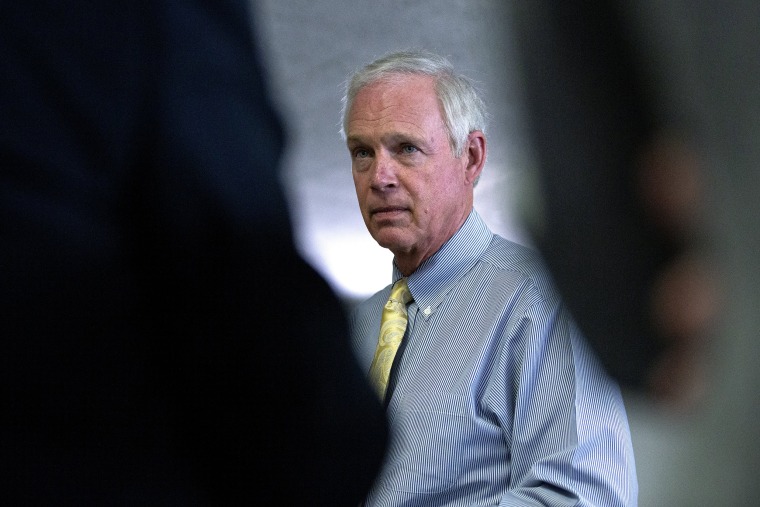When Sen. Ron Johnson (R-Wis.) announced plans for an event that would "question COVID-19 vaccine safety," many, including Wisconsin Gov. Tony Evers (D), urged him to reconsider.
Not surprisingly, the Republican senator ignored his reality-based critics. The result was predictable.
During a news conference Monday calling into question the safety of the Covid-19 vaccines, Republican Sen. Ron Johnson of Wisconsin again incorrectly used figures from an early warning system by the federal government to support his argument that vaccines may not be completely safe. Johnson argued that while most people don't suffer significant side effects following vaccination, he is concerned about "that small minority that are suffering severe symptoms." He pointed again and again to the number of reported deaths in the federal Vaccine Adverse Event Reporting System [VAERS] in setting up his argument warning against the vaccines.
CNN's report on this added that the Wisconsin Republican, even while citing these figures, conceded that the system "does not prove causation or necessarily even correlation."
If this sounds familiar, there's a good reason for that. This first came up in early May, when Johnson, under the guise of "just asking the questions," pointed to the VAERS system, saying, "We are over 3,000 deaths within 30 days of getting the vaccine. About 40% of those occur on day zero, one or two."
A HuffPost report explained soon after, "As the VAERS website clearly states, the reports it contains have not been verified, and anyone with an internet connection can submit one. It's not new; the CDC has been running it for three decades. But during the coronavirus pandemic, it has become a weapon for conspiracy theorists and anti-vaccination activists who use the numbers found there to spread misinformation about vaccines."
A spokesperson for Johnson told CNN last month that the senator was "not suggesting the deaths were directly caused by the COVID-19 vaccine." That's a nice clarification, as was the one Johnson added yesterday, but even the GOP senator must've realized how his comments would be received by the public. In the context of a discussion about vaccinations, Johnson brought up misinformation popular in anti-vaccine circles, and told a public audience about a possible connection between vaccinations and adverse health effects.
It's the kind of rhetoric that undermines public health.
Making matters worse, it's part of a pattern from Ron Johnson, whom Republicans put in charge of the Senate committee responsible for domestic security for six long years.
Circling back to our earlier coverage, it was just two months ago when the senator also appeared on a Wisconsin radio show to insist the COVID vaccine is "not a fully approved vaccine"; he's "getting highly suspicious" of the "big push to make sure everybody gets the vaccine"; there's "no reason" to encourage Americans to get vaccinated; and he has "doubts" in response to White House requests that the public should "trust the government."
Alas, this wasn't an isolated incident. As regular readers may recall, in mid-March 2020, as the scope of the coronavirus crisis was just coming into view, the Wisconsin Republican went further than most in downplaying the importance of mitigation efforts. As part of his case, the senator told the Milwaukee Journal Sentinel, "[W]e don't shut down our economy because tens of thousands of people die on the highways. It's a risk we accept so we can move about." This was a tragically bad argument, for reasons he didn't seem to fully grasp.
A couple of months later, Johnson was seen on the Senate floor without any facial covering. "I wear a mask when I go into grocery stores, that type of thing," the GOP senator said. "I think around here, we probably won't have to." This, too, was wrong.
In July 2020, Johnson argued that the United States "overreacted" in response to the coronavirus pandemic, which was unfortunate at the time, and which is a perspective that looks much worse now.
In late 2020, Johnson sunk lower, holding multiple Senate hearings to promote pseudo-science and conspiracy theories. Dr. Ashish Jha, dean at Brown University School of Public Health, appeared as a witness at one of the Senate hearings and was amazed by the Wisconsin senator's apparent suspicion that there's a "coordinated effort by America's doctors" to deny patients hydroxychloroquine because of a corrupt scheme involving physicians and the pharmaceutical industry.
More recently, YouTube found it necessary to suspend Johnson's account after he peddled unproven COVID treatments.
As we've discussed, when it comes to taking stock of the Wisconsinite's propensity for peddling nonsense, it's convenient to rely on separate categories. For example, the GOP senator has been cavalier about his indifference to an FBI warning that he was "a target of Russian disinformation" during the last election cycle. He's also denied ever having "talked about the election being stolen," despite ample evidence pointing in the opposite direction. Johnson's nonsense about the Jan. 6 attack has been especially ridiculous.
But when it comes to threatening public health, the Republican's rhetoric about the pandemic has been especially pernicious.
